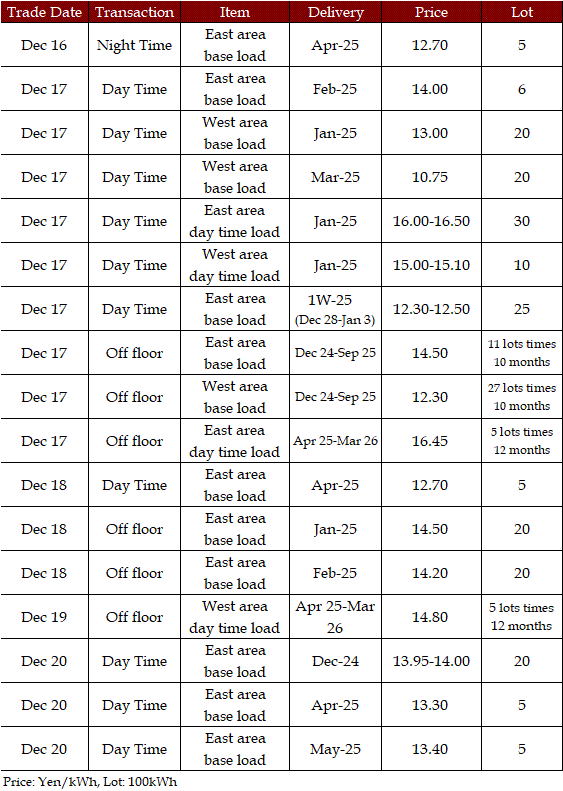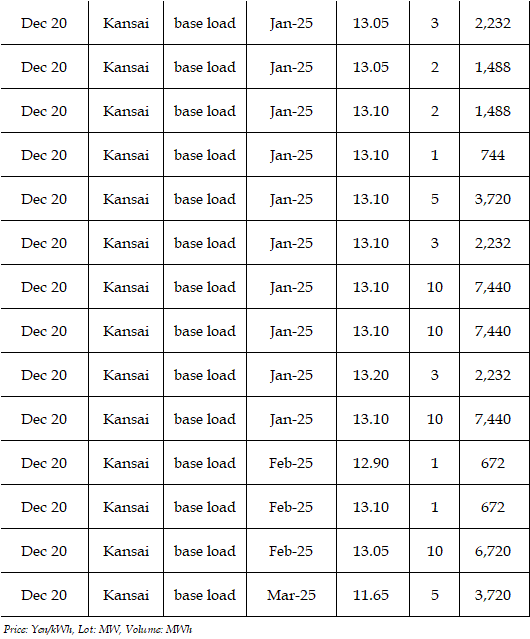|
In the day-ahead market on JEPX (Japan Electric Power Exchange), the 24-hour spot power prices on a weekly average basis for Dec 16-20 delivery rose further moderately from the previous week in both East Japan (50Hz) and West Japan (60Hz). But the price trends were directionless from area to area. Freezing winter climate went into full swing, but ample supply put a lid on spot prices. The mixed price movements by area were driven by a fluctuation in price decoupling. In three areas in East Japan, Hokkaido and Tohoku rallied sharply but Tokyo turned lower as price decoupling at the Tohoku-Tokyo border shrank. The Tohoku-Tokyo decoupling was observed only in 25 windows during Dec 16-20, down massively from 209 windows during Dec 9-13. In six areas in West Japan, Chubu and Shikoku lost ground but Hokuriku, Kansai, Chugoku and Kyushu headed north. Chubu was pulled lower by shrinking price decoupling at the Chubu-Kansai border while Shikoku was unaided by expanding price decoupling at the Chugoku-Shikoku border. The Chubu-Kansai decoupling occurred in 121 windows during Dec 16-20, down from 193 windows during Dec 9-13. The Chugoku-Shikoku decoupling was witnessed in 175 windows during Dec 16-20, up from 121 windows during Dec 9-13.
In Tokyo and Kansai, the key areas in East Japan and West Japan, the 24-hour average posted a difference in favor of the East by Yen 2.48 for Dec 16 delivery, Yen 2.75 for Dec 17 delivery, Yen 2.14 for Dec 18 delivery, Yen 0.44 for Dec 19 delivery, and Yen 0.66 for Dec 20 delivery.
In the fuel markets, LNG, coal and crude oil prices weakened altogether from the end of the previous week.
DES Northeast Asia spot LNG prices hovered around $13 per mmBtu for prompt February 2025 arrival as of Dec 19, down about 85cts from the end of the previous week (Dec 13). European natural gas prices collapsed further, and the LNG market in Northeast Asia followed suit. An unabated supply glut in Northeast Asia also overshadowed LNG prices. The Ministry of Economy, Trade and Industry (METI) announced on Dec 18 that Japan's LNG inventories for power generation stood at 2.24 mil mt as of Dec 15, up 120,000mt from a week before. The figure was down from 2.70 mil mt as of end-December last year, but up from the average of past five years at 2.16 mil mt.
FOB Newcastle thermal coal prices in Australia stood in the high $127 level per ton for January 2025 loading as of Dec 19. The level dropped by about $3 from the end of the previous week in reaction to a softness in gas prices.
In the crude oil market, WTI crude for January 2025 stood at slightly above $69 as of the afternoon on Dec 20 while Brent crude for February 2025 was trading in the mid $72 level. Both WTI and Brent gave up more than $2 from the end of the previous week. Crude futures were outpaced by profit-taking and also pressured by concerns over the economic outlook in China and US.
The actual highest price during the week was at Yen 29.25 in Chubu for Dec 20 delivery. Meanwhile, the actual lowest price during the week was at Yen 0.01 in Shikoku for Dec 16 and Dec 19 delivery.
By area, the weekly average of the 24-hour spot prices was at Yen 14.99 in Hokkaido, up Yen 3.25 from the previous week, Yen 14.65 in Tohoku, up Yen 3.98, Yen 14.89 in Tokyo, down Yen 1.47, Yen 14.95 in Chubu, down Yen 1.48, Yen 13.19 in Hokuriku, Kansai and Chugoku, up Yen 0.94, Yen 9.24 in Shikoku, down Yen 1.26, and Yen 11.97 in Kyushu, up Yen 1.06.
In the JEPX auction, volumes of offers were 1,193.34 mil kWh on a weekly average basis, up 2.2% from the previous week. Meanwhile, bids on a weekly average basis increased by 3.3% to 1,034.34 mil kWh. The weekly average of trade volumes expanded by 3.8% to 813.49 mil kWh.
Power demand in nine areas of Japan during Dec 16-20 was a combined 13,775.01 mil kWh, up 4.0% from 13,249.24 mil kWh during Dec 9-13. The figure was down 1.7% from the corresponding period a year earlier. Demand during Dec 18-22, 2023 after day of week adjustment was 14,015.21 mil kWh.
Deals reported on TOCOM (Tokyo Commodity Exchange) during Dec 16-20 were as below.

Deals reported on EEX (European Energy Exchange) during Dec 16-20 were as below.








In the fourth week of December, spot prices are expected to lack upward momentum. Chilly winter climate will continue to grip Japan, but ease temporarily in the middle of the week. The weather is forecast to be remain sunny led by the Pacific Ocean side mostly during the week, so that weather conditions will likely work rather unfriendly for spot prices than the third week. On top of that, the overseas fuel markets will be lackluster for the Christmas break in Europe and US. Overseas players play an important role in the Japan market including power futures. Thus, the futures market will be thinly traded in the fourth week, a factor that will leave spot activities quiet. In addition, stable power supply is believed to cap any rise in spot prices without unexpected troubles at generation facilities.
|
JEPX: System Price (Day Ahead 24 hours)
|
|
Weekday Price
|
16-Dec
|
17-Dec
|
18-Dec
|
19-Dec
|
20-Dec
|
|
24-Hour Ave
|
12.17
|
12.45
|
13.11
|
15.16
|
14.21
|
|
Volume (MWh)
|
803,025
|
801,503
|
801,082
|
825,402
|
836,447
|
|
(unit: yen per kWh) (date: delivery day)
|
|
|

|